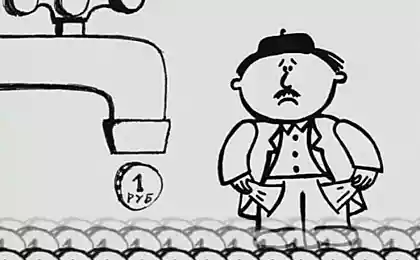372
Family savings in Italian
Sixty two million four hundred thirteen thousand seven hundred fourteen
The Italians, among other Europeans have a reputation as the most economical of the nation. In the Apennines of children from infancy taught to respect money, to save for a rainy day and not to waste pocket coins on trivia. No wonder the Italians are saving on everything and are the leaders among neighbors in Europe in terms of savings. What can we learn from the Italian experience?
When I settled in Italy and immersed himself in local life, was shocked, as I thought, skuperdyaystve: here taken to save strongly on everything — clothes, food, vacation and even utility bills. The Italian habit is to carefully plan the budget still sickens broad Russian nature, accustomed to live one day. However, there is still in the mania of the savings of Italians and rational — but this, however, to judge you.
For example, Thrifty Italian Housewives cook, wash and iron exclusively in the evenings on weekdays from 19 p.m. to 8 a.m. the electricity is cheaper. One of my local friend and completely erases woolen things only once a year, in may: energy saving without heating water, and things do not spoil or sit at a low temperature. And needless to say that almost all Italian homes have long been energy-saving light bulbs.
But it's all rather theory. But in practice? Will share me with you, perhaps a trick my mother in law how to save on conditioning, the subject is very necessary in the hot and humid Italian summer. In the summer after lunch the temperature here exceeds the limit, but early in the morning, even in the valley of Florence, where still live my parents-in-law, cool. Here the mother-in-law and gets up early in the morning, open all Windows to ventilate and cool the room, and then again closes the window, lowers the blinds and moves around the house in the twilight — because of the light bulbs is the heat! And air conditioning quietly sleeping under a layer of dust and turns on only at night, when the heat has not breathe. Who of you is ready to take this example on Board?
And, speaking of electricity, here at the apartment has only 3 kW/hour (or, if desired, 6 kW/hour compared with an installed capacity of 15 kW/hour in the Moscow new buildings!), and to make sure not to leave enabled at the same time oven, washing machine and iron — otherwise your apartment will automatically cut down the light. That's how "unobtrusive" the state encourages its citizens to ensure that carefully controlled volumes of energy consumed.
In General it is necessary to pay tribute to the Italian state, because there are a lot of measures to help its citizens to save. Here, for example, not to spend money on petrol, insurance and maintenance of your own car and paying my road (a highway here costs money), the government "helps" the Italians take the bikes (by the way, and for good health!) or by rental car. In Milan you can move around the city on bicycles BikeMi, to take a car by the hour or, if traveling in a large company on several machines, to pay for the automobile entry at a certain rate. But some of my colleagues cooperate together to get to the office in one car.
Developing further the theme of family savings, I can not share with you read once more recently in the Russian gloss a sketch about the everyday life of the French. Our compatriot, married to a Frenchman, says that, say, if the local hostess just in time for dinner suddenly come visit, then she is unlikely to invite them to the table — it is customary to plan and a family budget and a menu for the week, and the purchase of provisions. That is, unexpected guests is simply not enough food.
Ninety three million three hundred thirty nine thousand eight hundred seventy three
In Italy, however, the guest will not leave hungry and the table will invite, but your budget planning, and shopping in the supermarket for the week ahead — a common practice in many Italian families. Here are a few Italian secrets of purchasing supplies with an eye on the wallet:
Children's clothing in Italy buy for growth, the younger continue wearing things older kids and stuff for adults decided to purchase only to replace worn-out. By the way, Italians don't find anything wrong with buying used things: lately I've noticed in Milan, more and more thrift stores, and on the Internet you can sometimes find very attractive rates, moreover, with free delivery to your office or home.
Thrifty Italians have long made it a rule to dress exclusively on seasonal sales, branded stalls, outlets or special offers for example, at the liquidation store. However, our compatriots are not far behind — the last time in local discount stores, I often hear Russian speech.
But still, the main difference between Italian women customers from Russian is very aptly formulated as the clerk of the Milan Department store La Rinascente. According to her, Italian think ten times before buying, come try it on — and go away to think and look for something cheaper. And come back only if you can't find anything better and more profitable. But buyers from Russia, as a rule, immediately take any thing, but still will probably buy the new clothes and any accessory: for example, purse, makeup bag or keychain to match to the new purse.
The secret of the Italian economy can be summarized in ... of Russian folk wisdom: "seven times measure — cut once." And if the Italians are sometimes very stingy, that's Russian, on the contrary, just more likely to live in Grand style.
Very much the Russian attitude to wealth is very true in folk tales: greed in them is considered a Vice, and poverty — almost a virtue. A single-minded quest fairy-tale characters to get rich almost always ends in a fiasco — they are left with nothing. On the contrary, initially worthless, stupid and simple-minded heroes wealth is given by accident, as a pleasant addition to the enviable bride or wife saved. Here is our Ivan the fool in the end of the tale and consistently receives a beautiful Princess and half the Kingdom to boot!
And the Italian tale characters, by contrast, are very vain and almost always seek recognition and enrichment. When Pinocchio finally opens the door with a magic key, he finds there not a pretty Princess, and theatre — the way to glory!
Indeed, tale — lie, Yes in it a hint... posted
Source: www.matrony.ru/uroki-italyanskogo-semeynaya-ekonomiya/
The Italians, among other Europeans have a reputation as the most economical of the nation. In the Apennines of children from infancy taught to respect money, to save for a rainy day and not to waste pocket coins on trivia. No wonder the Italians are saving on everything and are the leaders among neighbors in Europe in terms of savings. What can we learn from the Italian experience?
When I settled in Italy and immersed himself in local life, was shocked, as I thought, skuperdyaystve: here taken to save strongly on everything — clothes, food, vacation and even utility bills. The Italian habit is to carefully plan the budget still sickens broad Russian nature, accustomed to live one day. However, there is still in the mania of the savings of Italians and rational — but this, however, to judge you.
For example, Thrifty Italian Housewives cook, wash and iron exclusively in the evenings on weekdays from 19 p.m. to 8 a.m. the electricity is cheaper. One of my local friend and completely erases woolen things only once a year, in may: energy saving without heating water, and things do not spoil or sit at a low temperature. And needless to say that almost all Italian homes have long been energy-saving light bulbs.
But it's all rather theory. But in practice? Will share me with you, perhaps a trick my mother in law how to save on conditioning, the subject is very necessary in the hot and humid Italian summer. In the summer after lunch the temperature here exceeds the limit, but early in the morning, even in the valley of Florence, where still live my parents-in-law, cool. Here the mother-in-law and gets up early in the morning, open all Windows to ventilate and cool the room, and then again closes the window, lowers the blinds and moves around the house in the twilight — because of the light bulbs is the heat! And air conditioning quietly sleeping under a layer of dust and turns on only at night, when the heat has not breathe. Who of you is ready to take this example on Board?
And, speaking of electricity, here at the apartment has only 3 kW/hour (or, if desired, 6 kW/hour compared with an installed capacity of 15 kW/hour in the Moscow new buildings!), and to make sure not to leave enabled at the same time oven, washing machine and iron — otherwise your apartment will automatically cut down the light. That's how "unobtrusive" the state encourages its citizens to ensure that carefully controlled volumes of energy consumed.
In General it is necessary to pay tribute to the Italian state, because there are a lot of measures to help its citizens to save. Here, for example, not to spend money on petrol, insurance and maintenance of your own car and paying my road (a highway here costs money), the government "helps" the Italians take the bikes (by the way, and for good health!) or by rental car. In Milan you can move around the city on bicycles BikeMi, to take a car by the hour or, if traveling in a large company on several machines, to pay for the automobile entry at a certain rate. But some of my colleagues cooperate together to get to the office in one car.
Developing further the theme of family savings, I can not share with you read once more recently in the Russian gloss a sketch about the everyday life of the French. Our compatriot, married to a Frenchman, says that, say, if the local hostess just in time for dinner suddenly come visit, then she is unlikely to invite them to the table — it is customary to plan and a family budget and a menu for the week, and the purchase of provisions. That is, unexpected guests is simply not enough food.
Ninety three million three hundred thirty nine thousand eight hundred seventy three
In Italy, however, the guest will not leave hungry and the table will invite, but your budget planning, and shopping in the supermarket for the week ahead — a common practice in many Italian families. Here are a few Italian secrets of purchasing supplies with an eye on the wallet:
- to make the home menu for each week in the month and for each menu, the corresponding list of products;
- keep strict account of expenses, recording absolutely all expenses, including chocolates, chewing gum and chips, caught "on the road", one notebook;
- store adhere to the pre-prepared list and within the list to prefer in the first place, seasonal products, products with special prices or under the brand name supermarket;
- to abandon the purchase of semi — finished products and home-cooked meals tastier, healthier and cheaper!
- possible to do yourself at home jam, bread, cookies, pies, etc.
- to unsubscribe from water in plastic bottles in favor of a filter on the faucet or a filter pitcher to water;
- do not buy packaged salads, slicing sausages, etc. — the same, but bulk foods are cheaper;
- to give preference to local producers — it will allow to save on transportation cost, "embedded" in the price of the products;
- choose bromodialone like "buy 3 for 2" only if you really use this product;
- not to buy anything from the shelves at the box office, while you're standing in line to pay.
Children's clothing in Italy buy for growth, the younger continue wearing things older kids and stuff for adults decided to purchase only to replace worn-out. By the way, Italians don't find anything wrong with buying used things: lately I've noticed in Milan, more and more thrift stores, and on the Internet you can sometimes find very attractive rates, moreover, with free delivery to your office or home.
Thrifty Italians have long made it a rule to dress exclusively on seasonal sales, branded stalls, outlets or special offers for example, at the liquidation store. However, our compatriots are not far behind — the last time in local discount stores, I often hear Russian speech.
But still, the main difference between Italian women customers from Russian is very aptly formulated as the clerk of the Milan Department store La Rinascente. According to her, Italian think ten times before buying, come try it on — and go away to think and look for something cheaper. And come back only if you can't find anything better and more profitable. But buyers from Russia, as a rule, immediately take any thing, but still will probably buy the new clothes and any accessory: for example, purse, makeup bag or keychain to match to the new purse.
The secret of the Italian economy can be summarized in ... of Russian folk wisdom: "seven times measure — cut once." And if the Italians are sometimes very stingy, that's Russian, on the contrary, just more likely to live in Grand style.
Very much the Russian attitude to wealth is very true in folk tales: greed in them is considered a Vice, and poverty — almost a virtue. A single-minded quest fairy-tale characters to get rich almost always ends in a fiasco — they are left with nothing. On the contrary, initially worthless, stupid and simple-minded heroes wealth is given by accident, as a pleasant addition to the enviable bride or wife saved. Here is our Ivan the fool in the end of the tale and consistently receives a beautiful Princess and half the Kingdom to boot!
And the Italian tale characters, by contrast, are very vain and almost always seek recognition and enrichment. When Pinocchio finally opens the door with a magic key, he finds there not a pretty Princess, and theatre — the way to glory!
Indeed, tale — lie, Yes in it a hint... posted
Source: www.matrony.ru/uroki-italyanskogo-semeynaya-ekonomiya/
























